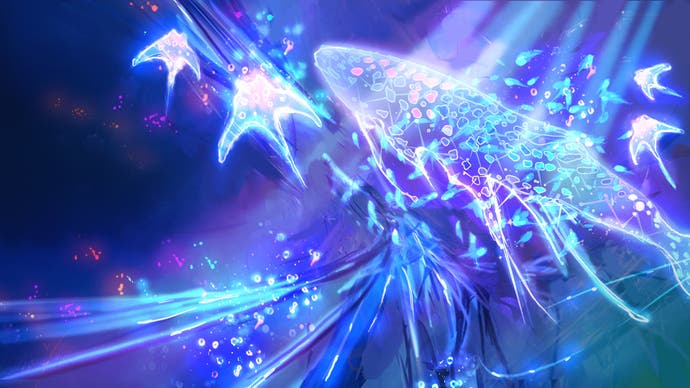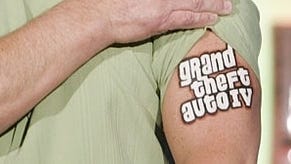Child of Eden
Child's play.
The controls are delightful: playful and elegant, with three different kinds of attack ranging from a paint-and-release system familiar to anyone who's played Rez (you release by waving), a rapid-fire mode where shots constantly nibble at whatever's under the cursor, and a sort of smart bomb triggered by throwing up both hands in victory, which the developers, naturally, have taken to referring to as the Happy Bomb. The reticule moves smoothly, and has a pleasing hint of weight to it, as if Mizuguchi is pushing it through as much as over something, and you change your attack style - this is brilliant - by clapping your hands.
The screen fragments into cubes during transitions, the disco ball boss eventually breaks into shiny green boxes that have to be shoved out of the way by the cursor in huge sticky clods, and at the end of it all the level's strange bloops, bleeps, drum breaks and Lumines-friendly squiggles of sound have come together to form a song by Mizuguchi's own band, Genki Rockets - the team that is responsible for all, I believe, of the in-game soundtrack.
Diving into a few of the other Archives, all half-finished, reveals a game that isn't short on imagination. In Beauty, we move quickly over a rolling mountainside covered in what look like crystalline fir trees - a frosty world of dark greens and underwater blues, eventually sparking the place to life by shooting at giant flowers that unfold in blooms of reds and pinks.

Beyond that lies Evolution, which starts with a slow swooping assault on a nest of axons and dendrites, riddled with molecular strands and looped fronds that slowly start to form twisting ladders of DNA. Enemy viruses evolve as you float through the level, amoebas giving way to neon jellyfish who can be tickled by rapid fire, before bloated clusters of nerve cells arrive to wriggle and bounce around like bright punch bags. Phalanxes of glass Manta Rays advance towards us, withering slowly under Mizuguchi's shots, until finally, if the game wasn't already a new-age daydream, a huge, spectral whale, its translucent white skin covered in little jewels of infection, sweeps into view, ready for a musical cleansing from the cursor.
It's clear, by this point, that it's very hard to describe what goes on during Child of Eden without sounding like a self-important 15-year-old amateur poet who exists on a diet of green tea, home-made psychotropics, and Rimbaud audiobooks.
To watch the game, however, and to see it unfolding on the screen, is charming and inclusive rather than elitist and pretentious. Mizuguchi mentions several times during the demo that it's been important to him to make a game that's about making players smile and feel positive about things, which is why you're "purifying" viruses when you shoot them rather than simply destroying them.
You can't help but suspect that he's going to be successful with that. If you love Rez, this is going to make you very happy. If you're Microsoft and you're looking for at least one core gamer hook for your new peripheral, you're going to be ecstatic. And if you're anybody else? You simply have no idea what's in store for you.
Child of Eden is due out for PS3 and Xbox 360 in Q1 2011.






.png?width=291&height=164&fit=crop&quality=80&format=jpg&auto=webp)



